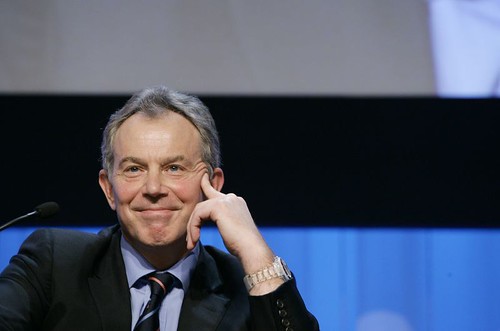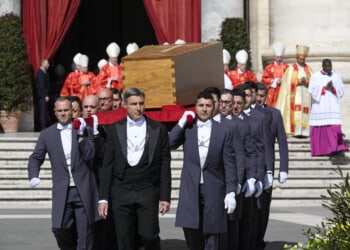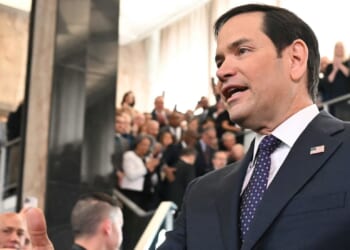Andrew Gilligan is a writer and former No10 adviser to Boris Johnson and Rishi Sunak.
I think we had an historic first for Reform last week – no, not that one.
That was the week before.
Last week’s historic first came on Friday, when The Times newspaper described Nigel Farage as “more nuanced” than Kemi Badenoch on the subject of the UK-US trade agreement.
In saying that Britain had been “shafted,” Badenoch was probably closer to the truth than Farage, as it happens. The United States has ended up with more than it started with. Britain has ended up with less. But Badenoch’s language didn’t work, because it got the tone wrong.
Every politician knows the cliché about your appearance and manner on TV being more important than what you actually say.
But appearance and manner apply to the written word, too, and to the tweeted one. In opposition, your only weapons are words, so the temptation is to make every statement a ballistic missile. But this is one fight where a weaker weapon is actually more effective, more damaging to your opponent.
Tony Blair, Britain’s most electorally successful postwar PM, knew that many voters work on feelings about politics, and see the arguments of Westminster as very distant background noise. They pick up tone more than detail. As Blair wrote in his memoirs, the ideal line of attack against an opponent was “low-key… I never made it overly harsh. I always tried to make it telling. The aim was to get the non-politician nodding.”
Storming that Minister X was a liar, a fraud or a hypocrite never did Minister X any harm, Blair said:
“The middle-ground floating voter kind of shrugs their shoulders at those claims. They don’t chime. They’re too over the top, too heavy, and they represent an insult, not an argument. Whereas the lesser charge, because it’s more accurate and precisely because it’s low-key, can stick. And if it does, that’s that.”
In this way Blair successfully defined his election opponents: John Major as “weak;” William Hague as “better at jokes than judgment;” Michael Howard as “an opportunist, and therefore unreliable”… any one of these charges, if it comes to be believed, is actually fatal.
This isn’t about substance, by the way.
If you get the tone right, you can say some pretty tough things. So instead of saying: “We must tame the woke blob!” how about something like: “Activists and lawyers are to the 2020s what trade unions were in the 1970s, an important part of society which will always have a vital role, but they’ve grown too powerful.” It amounts to the same.
Except that instead of performative aggression, exciting your supporters but alienating others, you have an argument, and a chance of capturing some people in the middle. The Tories are a capacious party: inclusive in the real, non-woke sense of that term. We look for points of agreement with people. The left and populists look for points of disagreement, heresies, deviations; they seek to cast out anyone who disagrees with even one of the full shopping-list of policies.
And actually, while aggressive words still alienate some, they may not even excite your supporters very much. People are impatient with rhetoric. They want action. They may see harsh language as politicians trying to fool them, trying to cover for their lack of action. That’s why Keir Starmer’s tough talk about an “island of strangers” may not work any better than Badenoch calling his immigration package “half-arsed.”
“Show, don’t tell” is one of the several golden rules of politics that Starmer hasn’t yet learned.
On the trade agreement, as well as pointing out its unbalanced nature, maybe Badenoch could have asked some questions. Were we too anxious to get a deal before the EU summit? Were we too keen to be the first? Is praise from Donald Trump really a good sign?
And as Farage shape-shifts, could the Tories be getting the tone wrong while their bete noire starts to get it right?


![Frontier Airline Agents Fired After Video Mocking Passenger on Camera Goes Viral [WATCH]](https://www.right2024.com/wp-content/uploads/2025/05/Frontier-Airline-Agents-Fired-After-Video-Mocking-Passenger-on-Camera-350x250.jpg)



![‘Liberal Sphincters Just Tightened’ [WATCH]](https://www.right2024.com/wp-content/uploads/2025/04/‘Liberal-Sphincters-Just-Tightened-WATCH-350x250.jpg)
![Trump Posts Hilarious Pope Meme, Leftists Immediately Melt Down [WATCH]](https://www.right2024.com/wp-content/uploads/2025/05/Trump-Posts-Hilarious-Pope-Meme-Leftists-Immediately-Melt-Down-WATCH-350x250.jpg)
![NYT Covered for Illegal Alien Accused of Raping a Corpse on NYC Subway [WATCH]](https://www.right2024.com/wp-content/uploads/2025/05/NYT-Covered-for-Illegal-Alien-Accused-of-Raping-a-Corpse-350x250.jpg)
![James Comer Hints at the Epic Behind-the-Scenes Effort Targeting the Deep State [WATCH]](https://www.right2024.com/wp-content/uploads/2025/04/James-Comer-Hints-at-the-Epic-Behind-the-Scenes-Effort-Targeting-the-350x250.jpg)






